Elite Scholars
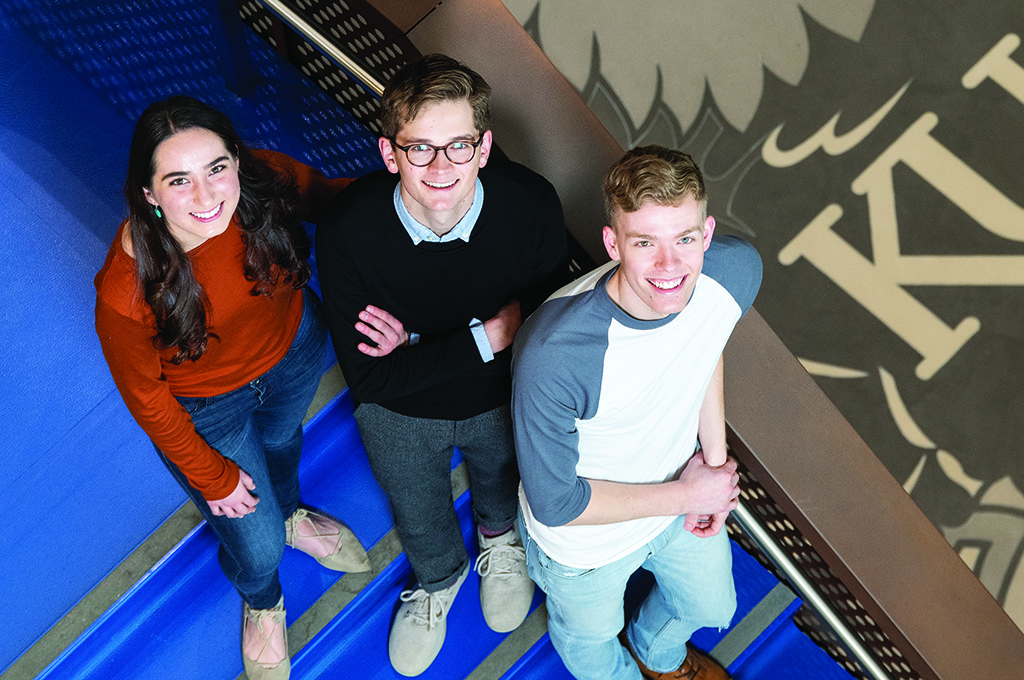
When Anne Wallen, c’03, received an offer in 2012 to join the University Honors Program staff, she “felt like the skies opened.” After earning her bachelor’s degree in Germanic languages & literatures and humanities & Western Civilization, she had been advising honors students on fellowships at the University of Minnesota, where she completed her master’s and doctoral degrees. Returning to KU was a dream come true.
Now program director at the Office of Fellowships, she has worked with scores of talented, ambitious young Jayhawks, expertly identifying scholarship and fellowship opportunities and guiding them through the arduous application process. This year, four KU students were named finalists for some of the most prestigious national awards, including the Rhodes, Marshall and Mitchell scholarships.
“Having four finalists was pretty wild,” Wallen says. “The most I’d had before for this caliber of competition was two, and four was more than twice the work.”
With more than 25 scholarships and fellowships to track, Wallen manages a formidable calendar of deadlines each year and oversees campus nominations and endorsements for 11 of the nationally competitive awards, as well as committees that support students through mentoring and practice interviews. Phillip Drake, a faculty fellow and associate professor of English, and graduate assistant Charlesia McKinney help Wallen with campus outreach and other projects.
Though Wallen is the first to admit that the process isn’t all about winning, capturing one—or in this case, three—of those coveted national honors is certainly sweet. Shortly before the fall semester ended, KU announced that Alex Murray, a finance and environmental studies major, had received the George J. Mitchell Scholarship; Sam Steuart, an American studies and biochemistry major, was awarded the George Marshall Scholarship; and Catalina Wedman, a Spanish major with minors in political science and global & international studies, was named the University’s second Charles B. Rangel Fellow.
These fellowships will fund the full costs of Murray and Steuart’s graduate degrees, as well as stipends for living expenses. Wedman will receive up to $95,000 in benefits for her advanced studies.
Considering that the acceptance rate is less than 5% and that many applicants hail from private and Ivy League institutions, the winning trio, Wallen and the University have much to be proud of.
“These are the best of the best,” Wallen says of KU’s competition for these prestigious awards. “But our students can be successful on the same kind of footing with students from all over the country. That’s what’s amazing about them.”
Alex Murray’s pursuit of degrees in finance and environmental studies—a somewhat unusual pairing—stems in large part from his Midwestern roots. At an early age, Murray developed a deep appreciation for the environment and agriculture, thanks to his parents, who grew up in farming communities. He nurtured that interest at Olathe Northwest High School, where he participated in debate and speech and learned the value of researching and understanding societal issues, including those that affect the environment.
“When you talk about the problem of climate change, it’s this existential threat to communities that are very close to my family,” Murray says. “That was a big inspiration for me. And I think debate really brought in the academic side of things, the awareness of current events. That combination pushed me to why I chose what I studied.”
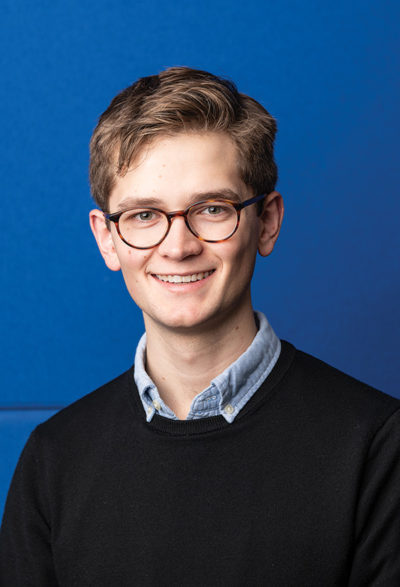
Though Murray initially had siloed his concern for the natural world from his education, a seminar during his freshman year in KU’s business leadership program helped him understand how his economic and environmental interests might converge. “I started to see that there was this overlap that was developing,” he says, “and it’s something that during my time at KU has become much clearer.”
In 2017, Murray co-founded Net Impact, a campus organization that aims to identify alternative career paths for business students and create lasting social and environmental change on campus and in surrounding communities. The student group has hosted several guest speakers who promote sustainability in their business endeavors, including the CEO of local coffeemaker The Roasterie and the mayor of Greensburg, the rural Kansas town that was rebuilt using green practices following a devastating tornado in 2007. Now recognized as one of the most sustainable communities in the United States, the town partnered with graduate architecture students in KU’s Studio 804 program to design and build the 5.4.7 Arts Center, the first LEED (Leadership in Energy and Environmental Design) Platinum building in Kansas.
“We wanted to bring awareness to students that they could do something with their careers that wasn’t just accounting or a very traditional role,” Murray says. “The skills that you learn as a business student are applicable in so many other contexts.”
Murray’s vision for his career involves using his expertise in finance to help combat the ongoing challenge of climate change. As one of 12 Mitchell Scholarship winners selected nationwide from a pool of nearly 360 students, Murray in fall 2020 will study renewable energy and climate finance at University College Dublin. He is only the second Jayhawk to earn this award, after Kathryn Ammon, c’19, won in 2018. Murray hopes to one day work at a global nonprofit organization like the World Resources Institute and eventually help influence economic policies at the United Nations.
“We need to change finance to meet the issue of climate change,” Murray says. “I hope to be a leader in that space.”
Amy Burgin, associate professor in ecology and evolutionary biology and environmental studies and associate scientist at Kansas Biological Survey, has seen Murray’s leadership potential firsthand through his work in her classroom. “He just has this great way of making people feel at ease and drawing people into conversation and having a real personal connection,” she says. “But then he also has this ability to synthesize information and make new insights and novel contributions. Some people do one or the other really well, and I think it’s rare to do both. He’s got a unique combo there.”
As a junior, Murray also launched the KU Beekeeping Club with two other students and recruited more than 400 members in its first year. The club has built and installed hives at the KU Field Station in North Lawrence and visited local classrooms to teach young children about the critical role pollinators play in the ecological sustainability of our planet.
Jim Guthrie, the William and Judy Docking Professor at KU’s School of Business, developed a bond with Murray over their shared love of beekeeping. “I’ve met a number of kids who would like to be able to change the world, and Alex is someone I think might actually be able to do it,” Guthrie says. “He wants to be able to make the economic and business case for dealing with the problems that are facing us in terms of climate and to be able to talk with multiple stakeholders in order to attack the problem. And he’s going after it full force. He’s preparing himself, I think, to really be able to make a difference.”
Sam Steuart’s life took a fortuitous turn during his freshman year at Shawnee Heights High School in Topeka. While attending one of his older sister’s volleyball games, a student’s mother asked him whether he would be as smart as his sisters, both of whom excelled in academics and athletics. “I had been dealing with those expectations my entire life,” recalls Steuart, who often felt overshadowed by his older sisters’ successes. “All I could muster was, ‘I sure hope so.’”
Another mother who witnessed the exchange approached a visibly distraught Steuart and encouraged him to discover his own path, possibly through a leadership experience like student council. That year, Steuart entered the race to become sophomore class president and won.
“That was where I found myself and I loved it,” says Steuart, who eventually became the school’s student body president his senior year. “From there it just became a thing.”
Steuart continued to take on leadership roles throughout his career at KU, becoming president of the pre-medicine fraternity Phi Delta Epsilon and executive director of KU’s Center for Community Outreach (CCO), an organization that provides service opportunities for students on campus and in neighboring communities. Steuart oversees 12 student volunteer programs, including the Campus Cupboard and Hawks for Health.
Mary Barnes Klayder, associate director of undergraduate studies and University Honors lecturer, was Steuart’s first faculty adviser at freshman orientation. She also has traveled with him on two study abroad trips and works with him at CCO.
“He’s amazing,” says Klayder, c’72, d’75, g’82, PhD’09. “I don’t think I’ve ever met anyone like him. He’s able to lead by being Sam, by having this incredible energy.” Regarding his work as executive director at CCO, she continues, “The number of volunteers he has is phenomenal, because he creates an energetic and positive space, and people want to go there.”
The Topeka native, who is on a pre-medicine track majoring in biochemistry and American studies with a minor in Spanish, was one of 46 students selected this year to receive the Marshall Scholarship, an honor KU last celebrated when Mark Bradshaw, c’01, won in 2003. The fellowship, which is awarded annually to high-achieving scholars nationwide, is named after former U.S. Secretary of State George Marshall and was created by the British government to bolster its alliance with the United States after World War II.
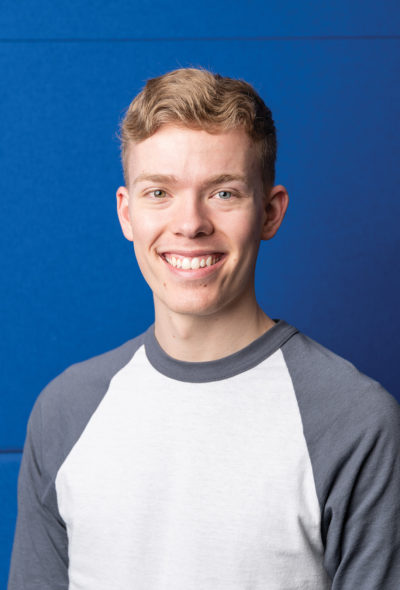
Steuart, who also was named KU’s 20th Harry S. Truman Scholar in April, plans to study comparative social policy at Oxford University in England, where he hopes to learn about the country’s welfare policies and programs and the success England has had in garnering public support for them.
Social equity in health care has been a central theme during Steuart’s time at KU. In addition to his roles with Phi Delta Epsilon and CCO, Steuart volunteers at the JayDoc Free Clinic at KU Medical Center and has worked with school-based health centers in Topeka, which deliver high-quality care to students of all socioeconomic backgrounds.
After earning his graduate degree at Oxford, Steuart plans to attend medical school and become a professor in medicine and public health, “to focus on equity and what we can do as physicians to ensure that we’re giving the same level of care to every single patient population,” he says.
Long term, Steuart hopes to become a leader in health care policymaking at the state and national levels and, eventually, run for political office—lofty goals that come as no surprise to Vincent Francisco, Steuart’s faculty mentor in the University Scholars Program.
“He’s got vision,” says Francisco, g’92, PhD’95, Kansas Health Foundation Professor of Community Leadership and senior scientist at the Life Span Institute. “He’s got drive. He’s ambitious. He really wants to see a better world, and he has no fear of putting himself out there to bring that about.”
Francisco recalls one of his first conversations with Steuart, during which the young man said he one day wanted to be governor of Kansas. “I think he’s going to have a bigger impact on the world than that,” Francisco says, “although that would be awesome if he were to do that. His getting the Marshall is just an indicator of where he’s going to go next.”
After graduating from high school in her native Costa Rica, Catalina Wedman moved to the United States to join her father, who had recently returned to his hometown in Harper, Kansas, to be near family. She took jobs at a grocery store and a restaurant, but soon found herself wanting to go back to school.
“My high school was really hard, and it needed to be worth it,” Wedman says. “I wanted to keep studying. That’s when I started looking at different colleges.”
She was shocked to learn how expensive continuing her education in the states would be. “The tuition is what people earn in two years in Costa Rica,” says Wedman, before adding with a laugh, “I literally Googled, ‘How do people pay for college?’”
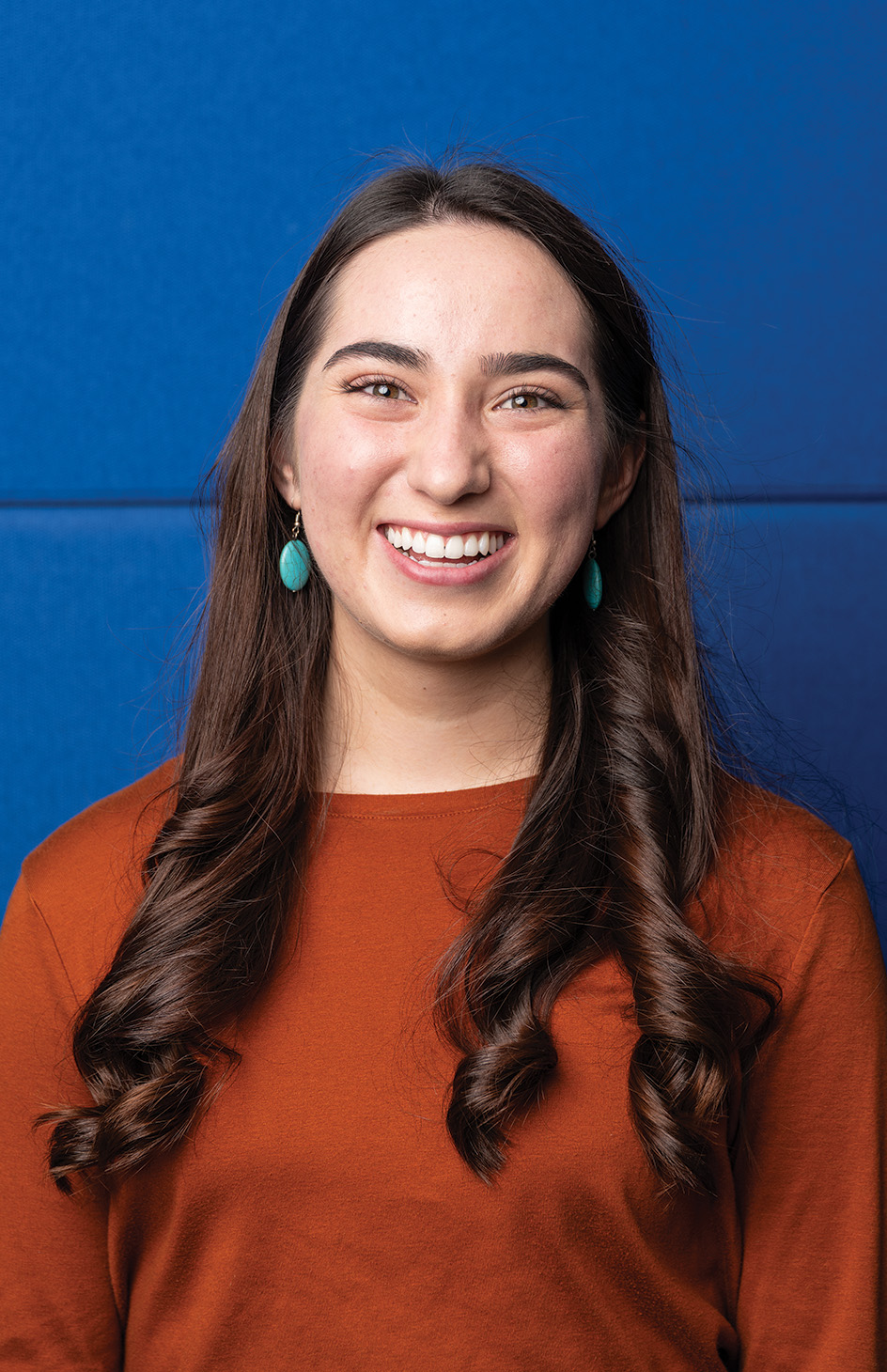
Armed with Pell grants and scholarships, she enrolled at Johnson County Community College in Overland Park, earning her associate’s degree and building a foundation to eventually attend KU. She wanted to become a Spanish professor.
During that time she also learned about KU’s McNair Scholars Program, which helps low-income, first-generation and underrepresented minority students prepare for doctoral study through paid research opportunities, faculty mentors and tutoring. Wedman was accepted in the program in fall 2017, her first semester at KU.
“They pay you to do research,” she says, “which is really important for low-income students. You want to get those experiences, but you can’t do it for free because you still have a lot of stuff to pay. It’s a great program.”
In addition to taking classes full time, Wedman also helped support herself by working 30 hours a week at JCCC’s International and Immigrant Student Services, commuting two hours each day on the bus. As she advanced through her courses at KU, she discovered that she no longer wanted to teach Spanish at a university; instead, she wanted to work in foreign policy and bring about positive, lasting change on an international scale.
Wedman took a giant step toward fulfilling that goal in December, when she received the Rangel Fellowship, which is funded by the U.S. Department of State. More than 800 people applied last year for the fellowship, and Wedman was one of 30 winners, only the second recipient from KU after Constanza Castro Zúñiga, c’19, won in 2018. She will receive up to $95,000 to support a two-year master’s degree in a field of study that relates to foreign service, as well as internships and other training opportunities. Wedman, who is assured a five-year contract as a foreign service officer when she graduates from the program, plans to study international affairs.
A member of the University Honors Program, Wedman also has studied abroad in Xi’an, China, and has completed a research fellowship with the Foreign Military Studies Office. Last year she received a Foreign Language and Area Studies (FLAS) Fellowship grant from the U.S. Department of Education, which has provided financial support during her final year at KU and allowed her to cut back on job responsibilities. She currently works part time as an intercountry adoptions student trainee at U.S. Citizenship and Immigration Services in Kansas City, a job she feels will ultimately prepare her for a career in foreign service—and one that occasionally has reminded her of home.
“When I was in Costa Rica, right across my street was this orphanage,” Wedman recalls. “Once I was working here in Kansas, reviewing this adoption document, and it was from Costa Rica. It was from that orphanage. When I was little I just saw it, and I didn’t think I could do anything about it. Now I know some of the decisions you make can make sure a child goes to a good home.”
Mulu Lemma, director of the McNair Scholars Program, met Wedman when she first applied for the program. “She is definitely one of the most hardworking people I’ve met,” says Lemma, c’05, g’10, emphasizing that Wedman excelled in her classes while working nearly full time in Kansas City. “She is really well-organized, detail oriented. She is also super-empathetic. She cares deeply. Both her career and academic aspirations are connected to a deeper, bigger picture and making a meaningful contribution to society.”
Lemma believes those traits will serve Wedman well as she prepares for a career in foreign service. “I think what’s going to make her successful is she is very determined to be that person who provides a gateway to diplomacy, a gateway to peace and a gateway to connect different people to each other.”
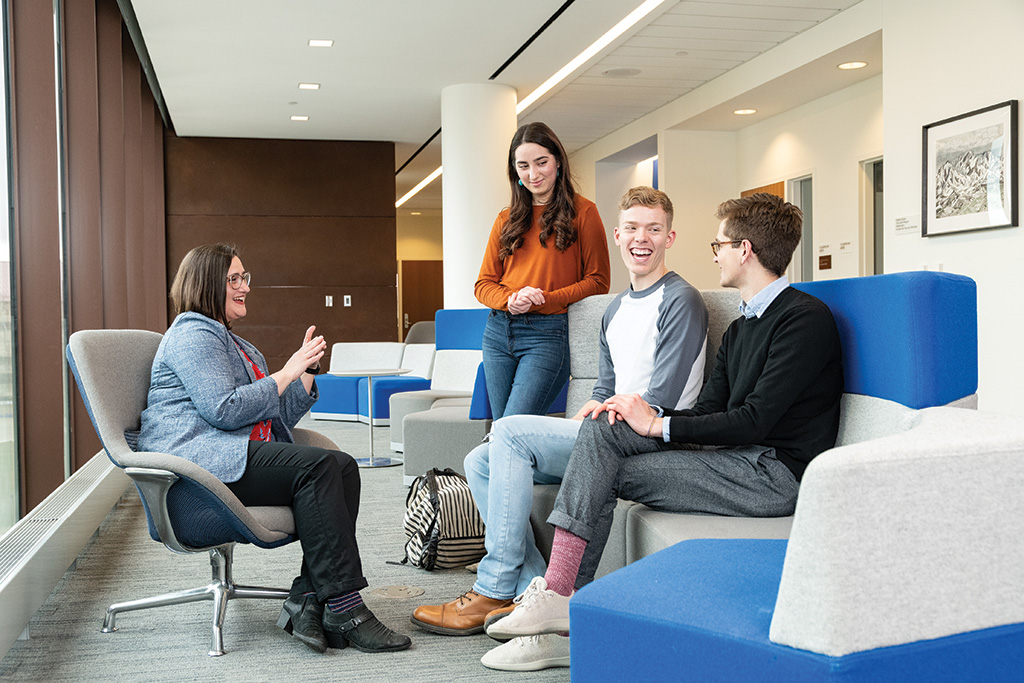
In 2017, at the prompting of DeAngela Burns-Wallace, then vice provost for undergraduate studies, the Office of Fellowships transitioned out of the University Honors Program and became part of undergraduate studies, a move that ultimately has allowed Wallen to expand the office’s mission and connect with more students.
“A lot of people thought you had to be in the honors program to apply for these scholarships, which was never true,” Wallen says. “But there was this perception that was hard to overcome.”
Now housed in Summerfield Hall with the Center of Service Learning, the Center for Undergraduate Research and the University Career Center, the office’s central location is easily accessible and welcoming for all students on campus—even those who aren’t in the honors program. Wallen says the move also has improved interaction and collaboration with those campus partners in the former School of Business building, many of which see a steady stream of students inquiring about experiential learning opportunities and career counseling services.
Wallen casts a wide net when identifying Jayhawks for nationally competitive awards, enlisting “campus scouts,” as she calls them, and tapping into high-achieving student groups like the McNair Scholars Program, the honors program and the University Scholars and Global Scholars programs. “Any student who’s even applying to those could be a national fellowship candidate,” Wallen says, “because they have that extra ambition.”
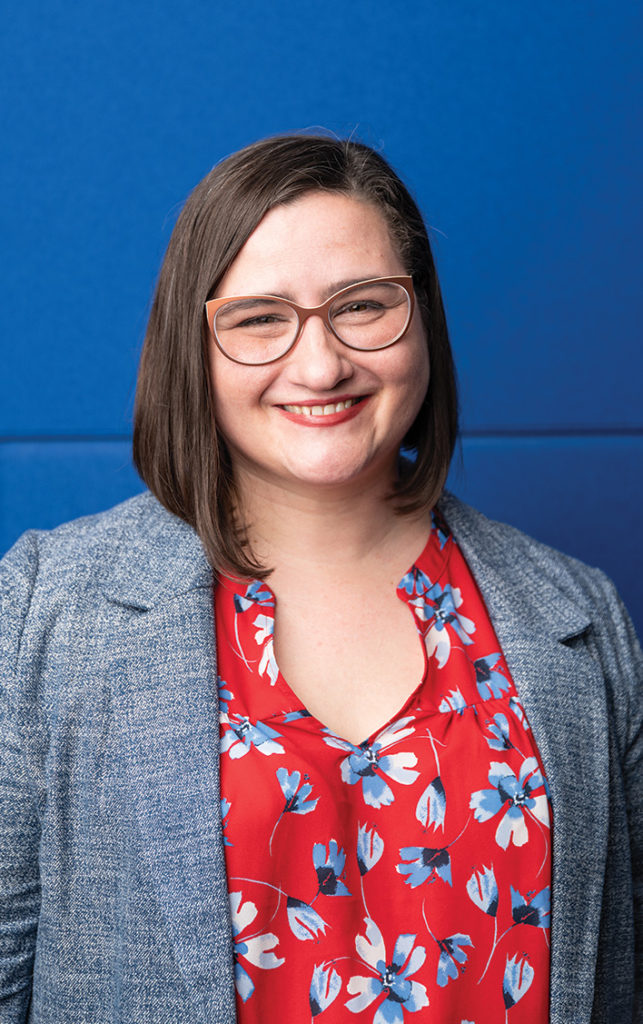
Determination and drive are vital for students interested in fellowship opportunities. Under Wallen’s guidance, the vigorous application process typically includes a series of thought-provoking questions, written essays and, depending on the fellowship, even experimental research papers. “That’s the wonderful thing about the applications themselves is that they’re very pedagogical,” Wallen says. “They ask the students to think through specific things and answer questions that they probably haven’t had to think about before.”
Articulating their interests, career goals and personal strengths proved to be an invaluable experience for this year’s fellowship winners. “It really encourages you to think about what compels you, what motivates you and why you’re doing it,” says Steuart, who submitted applications for the Truman, Marshall and Rhodes scholarships.
Murray, who competed for the Rhodes, Marshall and Mitchell scholarships, encourages any interested students to participate in the process. “It does give you that moment of clarity as you begin to prepare to leave KU,” says Murray, who views the experience as beneficial for job hunting as well. “Had I not gone through something like this, it would have been really hard to know where I wanted to go next.”
Eleven of the top fellowships require campus nominations, including the Marshall and Mitchell scholarships, which Murray and Steuart competed for and won. Wallen recruits KU faculty, staff and community members to serve on those nomination committees and also support students through practice interviews and mentoring. Though Wedman’s Rangel Fellowship did not require campus nomination, she still benefited from one-on-one advising with Wallen, as well as mock interviews with committee members.
“I counted, and working with people, thanks to Anne, was more than 15 hours,” Wedman says, in addition to the time spent crafting her essays and contemplating answers to interview questions. “It was a lot of time, but it’s worth it, because I know how many hours I’ve had to work to pay for other things in my school.”
Wallen collects feedback each year from students who apply for fellowships and uses that information to help guide future candidates. She also taps into the experience of past winners, including Ruth Anne French-Hodson, c’05, and Kelsey Murrell, c’12, the University’s 25th and 26th Rhodes Scholars; and Brenda Eisele Jackson, c’90, and Melinda Carden Lewis, s’99, who won Truman Scholarships in 1988 and 1999, respectively. Longtime faculty member Barbara Schowen, assoc., professor emerita of chemistry who retired in 2003 after nearly three decades at KU, also serves as an invaluable resource, after guiding hundreds of students through the application process when she led the honors program from 1996 to 2003.
“It’s a big team project,” Wallen says. “A multiyear, multigenerational project.”
The impact that Wallen, the campus community and KU alumni have had on this program is immeasurable, a view enthusiastically shared by Murray, Steuart and Wedman, all of whom emphasized that the University’s support and investment in them was critical to their success. And considering that Wallen was among the first to hear from each student upon winning, it’s safe to say that she’s doing something right.
“People say, ‘What’s the key or what’s the secret?’” Wallen says. “The secret is that there’s no formula. It has to be these students who have figured out something that really drives them and motivates them, and find a way to bring it all together. I can’t take credit for them having done all those things. But it’s my job to help them put it together in a coherent and compelling application so that other people can get the message of how cool they are.”
Best of the Best
Here’s a look at the number of Jayhawks who have won some of the most prestigious national fellowships:
Astronaut Scholarship 11
Goldwater Scholarship 67
Marshall Scholarship 10
Mitchell Scholarship 2
Rangel Fellowship 2
Rhodes Scholarship 27
Truman Scholarship 20
Udall Scholarship 20